Editor's Picks: Hot, Green Commodity
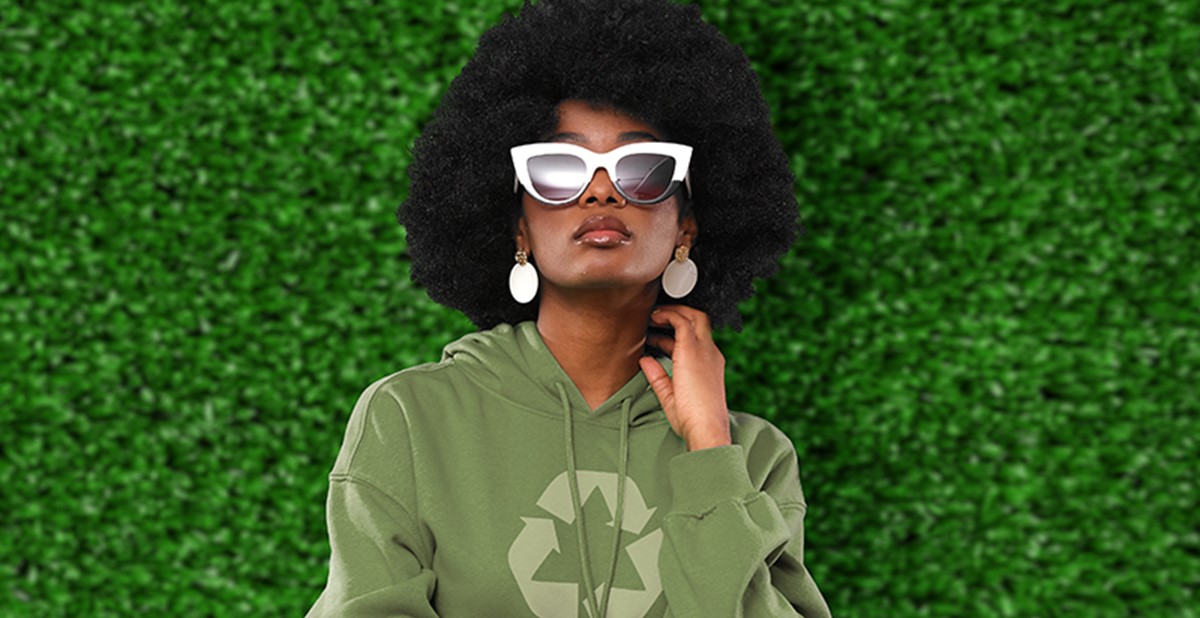
GoodStudio / marekuliasz / mikeforemniakowski / pim pic / Shutterstock.com
Eco-friendly consumerism is here to stay. With a year of record-breaking floods and wildfires behind us, environmental awareness is now part of everyday life. In the U.S., as of early October 2021, there were 18 weather-related events, including storms, heatwaves and flooding, a record high, with losses exceeding $1 billion each. The average number of billion-dollar events per year is seven, according to the National Centers for Environmental Information. These ecological threats are happening globally, too. The Institute of Economics and Peace says the number of weather-related disasters in the world has increased 10-fold since the 1960s. Data captured between 1900 and 2019 reveal a global increase from 39 events in 1960 to 396 in 2019.
More consumers want to take part in sustainability efforts, and the pandemic has brought greater awareness. A 2020 study by creative research platform Visual GPS found that 69 percent of respondents said they were doing everything possible to minimize their carbon footprint, up from 63 percent just a year earlier. Half of all global consumers surveyed say they’ve become even more eco-aware, according to PwC’s June 2021 Global Consumer Insights Pulse Survey. In 2019, just 35 percent of respondents said they chose sustainable products to help protect the environment and only 37 percent said they looked for products with environmentally friendly packaging. But PwC’s recent survey results show responses to similarly worded questions increasing 10 to 20 percentage points higher, post-pandemic.
The drive toward eco-friendly products reflects the public’s concern about the environment. According to a global analysis conducted by the Economist Intelligence Unit (EIU), internet searches for sustainable goods around the world have increased by 71 percent in just five years. Since the EIU began its analysis in 2016, the global volume of Twitter conversations about nature-loss has increased by 65 percent, and over 159 million people have participated in biodiversity-related campaigns. This rise in public discourse and activism has likely helped shift consumers toward green consumerism.
Demand for sustainable goods is increasing exponentially. According to research from 2013 to 2018, conducted by NYU Stern’s Center for Sustainable Business, the number of products marketed as sustainable grew 5.6 times faster than products that were not. And when it comes to price, potential environmental impact matters more. According to a study by GreenPrint, an environmental technology company, 78 percent of people are more likely to purchase a product that is clearly labeled as environmentally friendly. Nearly two-thirds (64 percent) of Americans are willing to pay more for sustainable products.
Eco-friendly promotional products can help distributors and their clients enhance brand reputation and educate the public—all while improving the bottom line. Denise Taschereau, co-founder and CEO of Vancouver, British Columbia-based distributor Fairware Promotional Products, says distributors can start introducing eco-friendly products in two ways. “The first is to start asking your clients if sustainability or corporate social responsibility is important to them and if they want to see options reflected in their merchandise. Many companies have policies and strategies in place to address their environmental impact and will welcome a conversation about how you can help,” says Taschereau. “The second is to start to share more information about your products. If you can find it, start adding information about where the products were made, and what they’re made from. A good first step is to just start adding eco-friendly options in your presentations, whether clients ask for it or not. You might be surprised by what they pick.”
But finding eco-friendly products isn’t an easy task. The GreenPrint study found that most Americans (74 percent) don’t know how to identify sustainable products, and most people doubt companies when say they are environmentally friendly. Fifty-three percent of Americans never or only sometimes believe such claims, and to trust a company statement, 45 percent of Americans say they need approval from a third-party. Distributors can become guides for companies looking to connect with consumers’ new green consciousness. Understanding and communicating how products are eco-friendly is key. Taschereau says, “Starting in 2020, we’ve seen a surge in the number of eco-friendly products in our industry, and they’re showing up less as ‘niche’ products and more as core offerings. We’ve seen suppliers up the standard for product descriptions and marketing materials to ensure that statements are accurate and that the information is easy to share with our end buyers.”
Consumers want to see action on the environmental issue. According to a survey from BCG, a marketing consulting firm, 87 percent of people said companies should integrate environmental concerns into their products, services and operations to a greater extent than they have in the past. This consumer expectation has the cost of recycling rising and consumer brands competing to meet sustainable packaging pledges. Data from S&P Global Platts show how spot prices for recycled PET, or polyethylene terephthalate, which is the most common type of resin made from plastic-bottle waste, have almost doubled in Europe from the beginning of 2021 to year end.
While environmental rules on packaging are less strict in the U.S., packaging prices have also increased, but not by as much. The cost of food-grade recycled PET in the U.S. has hit $1 a pound, up from around 64 cents before the pandemic, according to the National Association for PET Container Resources (NAPCOR). The Wall Street Journal says household-name brands that have set voluntary targets to reduce the amount of virgin plastic they use in packaging are adding to the demand for recycled plastic. By 2025, Nestlé, the world’s largest food company, wants to cut its use of virgin plastic by one-third. Coca-Cola wants to be using at least 50-percent recycled materials for its product packaging by the end of the decade. Because manufacturers have developed a process for recycling PET into a polyester fabric, or RPET, other industries are vying for this hot commodity to make carpets, backpacks and clothing.
Local governments are also struggling with the costs of recycling. A new state law in Maine will make producers of packaged goods pay to recycle them, potentially setting a precedent for the rest of the nation, says CNBC. The law will force companies that produce garbage from packaging to fund its recycling by paying into a fund that reimburses municipalities, an initiative formally called “extended producer responsibility.”
With high demand and little supply, distributors can use their skills to help clients satisfy and educate their eco- conscious end users.
––––––––––––––––––––––––––––––––––––––––––––––––––––––––––––––––––––––––––

B-CORP: business meets high social and environmental performance standards
BLUESIGN: no concerning chemicals in the supply chain or process
CRADLE TO CRADLE: achievements across five sustainability categories
ECOCERT: meets environmental and social requirements
ENERGY STAR: ensures energy efficiency
EPA SAFER CHOICE: safe for human health and the environment
EPEAT: electronics that meet strict environmental criteria
FAIR TRADE CERTIFIED: meets rigorous social, environmental and economic standards
FAIRTRADE: meets internationally agreed social, environmental and economic standards
FSC: comes from responsibly managed forests
GREEN GOOD HOUSEKEEPING SEAL: meets environmental impact and social responsibility standards
GREEN-E: renewable energy that meets environmental standard
GREENGUARD: low chemical emissions to improve air quality
LEED: globally recognized sustainability rating for buildings
MADESAFE: made with safe ingredients and without known toxic chemicals
MARINE STEWARDSHIP COUNCIL: promotes sustainable fishing
OEKO-TEX: tested to ensure no harmful levels of chemicals
SEAFOOD WATCH: promotes sustainable seafood
USDA BIO BASED: made with ingredients derived from plants
USDA ORGANIC: certified organic product
WATERSENSE: certified to use less water and save energy
Source – Good Housekeeping
––––––––––––––––––––––––––––––––––––––––––––––––––––––––––––––––––––––––––

The definition of eco-friendly is “not environmentally harmful,” according to Merriam-Webster. For a product to be eco-friendly it must be safe for the environment, from production to packaging. But for a product to be properly labeled as eco-friendly, the Federal Trade Commission’s Green Guides say the packaging must explain why the product is environmentally responsible. To avoid making misleading marketing claims, or “greenwashing,” understanding how a product is eco-friendly is important. See below for commonly used “green” claims.
 Biodegradable - A marketer making an unqualified degradable claim should have competent and reliable scientific evidence that the entire item will completely break down and return to nature (i.e., decompose into elements found in nature) within a reasonably short period of time after customary disposal.
Biodegradable - A marketer making an unqualified degradable claim should have competent and reliable scientific evidence that the entire item will completely break down and return to nature (i.e., decompose into elements found in nature) within a reasonably short period of time after customary disposal.
 Compostable - A marketer claiming that an item is compostable should have competent and reliable scientific evidence that all the materials in the item will break down into, or otherwise become part of, usable compost, like mulch, in a safe and timely manner in an appropriate composting facility, or in a home compost pile or device.
Compostable - A marketer claiming that an item is compostable should have competent and reliable scientific evidence that all the materials in the item will break down into, or otherwise become part of, usable compost, like mulch, in a safe and timely manner in an appropriate composting facility, or in a home compost pile or device.
 Non-toxic - A non-toxic claim likely conveys that a product, package or service is non-toxic both for humans and the environment, generally. Therefore, marketers making non-toxic claims should have competent and reliable scientific evidence that the product, package or service is non-toxic for humans and for the environment, or should clearly and prominently qualify their claims.
Non-toxic - A non-toxic claim likely conveys that a product, package or service is non-toxic both for humans and the environment, generally. Therefore, marketers making non-toxic claims should have competent and reliable scientific evidence that the product, package or service is non-toxic for humans and for the environment, or should clearly and prominently qualify their claims.
 Recyclable - A product or package should not be marketed as recyclable unless it can be collected, separated or otherwise recovered from the waste stream through an established recycling program for reuse or use in manufacturing or assembling another item.
Recyclable - A product or package should not be marketed as recyclable unless it can be collected, separated or otherwise recovered from the waste stream through an established recycling program for reuse or use in manufacturing or assembling another item.
 Recycled content - A product contains recycled content if it is composed of materials that have been recovered or otherwise diverted from the waste stream, either during the manufacturing process (pre-consumer) or after consumer use (post-consumer).
Recycled content - A product contains recycled content if it is composed of materials that have been recovered or otherwise diverted from the waste stream, either during the manufacturing process (pre-consumer) or after consumer use (post-consumer).
 Renewable materials - Marketers may minimize the risk of unintended implied claims by identifying the material used and explaining why the material is renewable. Marketers should also qualify any ‘‘made with renewable materials’’ claim unless the product or package is made entirely with renewable materials.
Renewable materials - Marketers may minimize the risk of unintended implied claims by identifying the material used and explaining why the material is renewable. Marketers should also qualify any ‘‘made with renewable materials’’ claim unless the product or package is made entirely with renewable materials.
 Sustainable - The practice of protecting natural resources while maintaining a prospering economy for future generations. The three pillars are: people, planet and profit.
Sustainable - The practice of protecting natural resources while maintaining a prospering economy for future generations. The three pillars are: people, planet and profit.
Source – FTC Green Guides
––––––––––––––––––––––––––––––––––––––––––––––––––––––––––––––––––––––––––

This trendy, eco-conscious backpack is made of recycled PET fabrics. Designed for busy multitaskers, this backpack has interior organizing pockets, a front zippered pocket, two side pockets and a fully lined interior padded laptop sleeve.
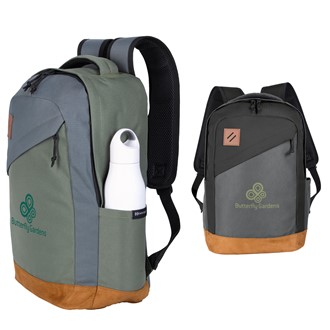
Koozie Group / PPAI 114187, S13 / www.kooziegroup.com
––––––––––––––––––––––––––––––––––––––––––––––––––––––––––––––––––––––––––
This eco-conscious pouch is made of recycled PET fabrics with color accents. Reusing available materials saves resources and is one action that makes a positive impact. Made with 76-percent post-consumer recycled PET equivalent to two plastic water bottles, it has a zippered main compartment, a front slip pocket and a carry handle with grommet.
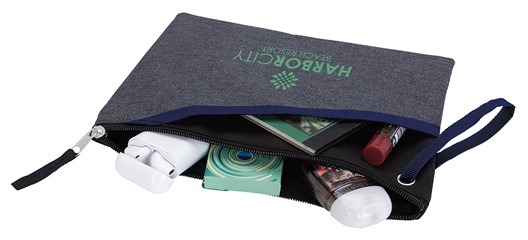
Koozie Group / PPAI 114187, S13 / www.kooziegroup.com
––––––––––––––––––––––––––––––––––––––––––––––––––––––––––––––––––––––––––
Use this recycled cotton market bag time and time again for any client. Crafted of eight-ounce recycled cotton, the full-size grocery tote includes an educational product hangtag, sturdy 22-inch shoulder straps and has plenty of space to add on a message or logo in a variety of locations.
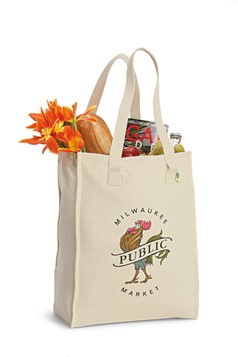
Gemline / PPAI 113948, S11 / www.gemline.com
––––––––––––––––––––––––––––––––––––––––––––––––––––––––––––––––––––––––––
The ApPeel® Medio Slim is a journal made from apple peels that are ground and emulsified into an organic paper. This groundbreaking eco-friendly product is animal-friendly, sustainable and all natural. It includes 160 ruled pages, gray end pages with colorful stripes, a back paper pocket and a gold ribbon marker.
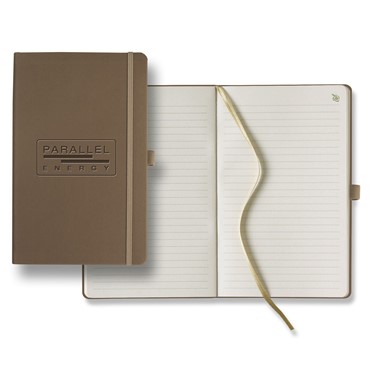
Castelli Magnet / PPAI 155640, S7 / www.themagnetgroup.com
––––––––––––––––––––––––––––––––––––––––––––––––––––––––––––––––––––––––––
This sleek 12-ounce stainless-steel water bottle saves countless single-use water bottles and cups for those on the go. The bamboo lid can be laser engraved with a logo or company name. The durable design of this bottle makes it work well for those who are active or who participate in outdoor activities.
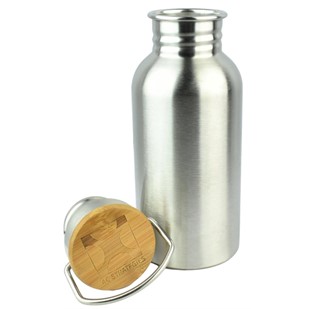
Active Life Promo / PPAI 436753, S1 / www.activelifepromo.com
––––––––––––––––––––––––––––––––––––––––––––––––––––––––––––––––––––––––––
Puzzles are loved by all. This natural wood hexagon puzzle game will be a marketing hit at the next trade show or event. Customize it with your client’s logo or event slogan for a fun giveaway.

Alpi International, Ltd. / PPAI 111221, S6 / www.alpi.net
––––––––––––––––––––––––––––––––––––––––––––––––––––––––––––––––––––––––––
Home for the Soul is a coffee table book that does more than look beautiful. Through full-color imagery, this book shows readers how to create a stunning home that suits its inhabitants while causing minimum damage to the environment, such as using nontoxic vegan paints and fabrics. It looks at choices in sustainable, renewable and reclaimed materials, using traditional skills and choosing organic and hand-produced homewares.

The Book Company / PPAI 218850, S5 / www.thebookco.com
––––––––––––––––––––––––––––––––––––––––––––––––––––––––––––––––––––––––––
This custom plant-based mailer creates zero waste and is 100-percent compostable. With every order, supplier TishWish plants a tree.
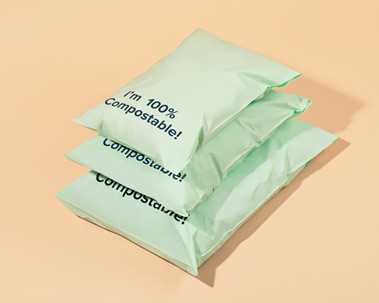
TishWish / tishwish.com
––––––––––––––––––––––––––––––––––––––––––––––––––––––––––––––––––––––––––
Kristina Valdez is associate editor for PPB.

